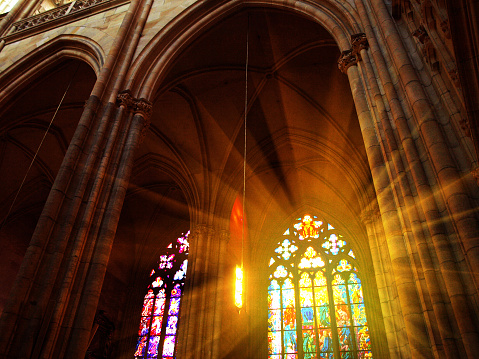Through a Glass Brightly
I recently attended a play (masked but in person – hooray!), Minor Character, subtitled “Six Translations of Uncle Vanya at the Same Time”. To say it was raucous would be an understatement. The gentle, poignant Chekhov play I had always known suddenly turned into circus, loud, brash, and very much in-your-face in its presentation of the play’s timeless themes. Unlike Chekhov, the writers and performers were definitely not going for subtlety or depth of character. But then, it was a play commenting on a play, so, I guess, fair enough.

But my purpose here is not to give you a play review. Instead, I wanted to take one of the themes we saw so aggressively proffered to us in Minor Character and so richly and beautifully presented in the original Uncle Vanya and relate it to what has happened to so many of us in our Church. Succinctly, the theme focuses on what happens to individuals when they have no vision in life.
In Uncle Vanya, the main characters, who have lived privileged middle to upper class comfortable lives, are suddenly faced with the onslaught of massive changes which they see as destroying all they have known and relied on and believed in. As they each look for a way to survive in this new world, they find a kind of paralysis setting in. They cannot imagine a way forward, and so they retreat – into either a stifling, scarred and tattered version of the past or into no movement at all.
Retreat, however, proves torturous and poisonous. It forces them to confront for the first time their disillusionment with what they once saw as true and right and worthwhile; to question their once sacrosanct traditions, and to see with brutal clarity the futility of what they once considered noble endeavors. Searching for an escape through myopic eyes, they see their only way forward is to hold onto the remnants of a past that grants no real refuge.
Within the play there are hints of what could be if only they were able to transform themselves into visionary people. An outsider even prods them to be exactly that, but to no avail. They are too afraid of losing what little they have preserved, worthwhile or not, lest, in doing so, they lose what self-definition, what prestige, what dignity, what pride in their own value they do have.
If I had held onto my childhood and adolescent relationship with the traditional Catholic Church, I fear I might have ended up paralyzed, too. I might have sat in my suburban home, comfortable and complacent, rationalizing away the injustices rampant in my Church because its tenets and example had always defined my role in life.
I would not have needed vision of what other version of Catholicism might be possible, not to mention fulfilling and vibrant and relevant and inclusive, because what value I did have, what “noble endeavors” I did at least try to undertake, what guided, directed, and sustained me was right here, as it was and always will be even to the end of time, amen. It might still be clothed in medieval drama and costuming, packaged in prescribed prayer and ritual, underscored by dogma and dictums, and explained to me by male clerics rather than by me or by my community, but it was familiar and safe even in its current battered and tattered condition, I just had to close my eyes and remember, for, let’s face it, I did not need vision if I wasn’t going anywhere anyway.

Thinking through what might have happened and why in this scenario does help me understand why people are still sitting in pews in traditional Churches unmoved (physically and emotionally) by change. It’s so safe, and you don’t have to do the hard work of envisioning anything else.
Blessedly, truly blessedly, that outcome did not happen for me and for so many of us thanks to Vatican II, Church reform movements like WOC, alternative expressions of Church like small Eucharistic communities, and much more. We, so, so fortunately, learned how critical it is to have vision for ourselves and our Church, to think and dream and listen and learn from each other about what could be and then work to make it happen.
Vision has kept us resilient. Vision has helped us see wider and deeper than we could have imagined. Vision has united and refreshed us. Vision has given us direction and voice. Vision has kept us engaged. And, now with the Pope’s synodal process’ call for the entire Church community to discern what a new Church for a new day might look like, we have the chance to reveal, on an international stage, the visions we have been creating and implementing for so many years. If we listen, we can see even more; if they listen, they can … see.
If they listen…if they listen….
